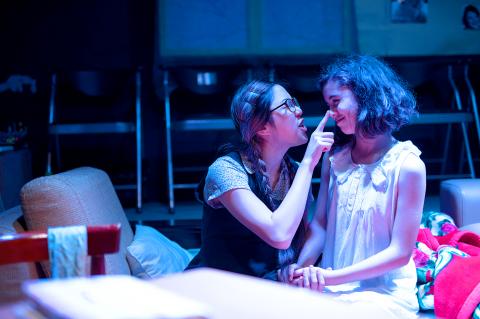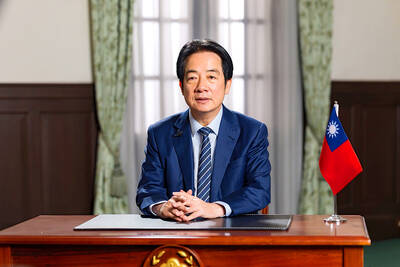To close out Butterfly Effect Theatre’s season, director Brook Hall has a clear winner with Wendy Kesselman’s 1997 adaptation of The Diary of Anne Frank.
In the brief space of two hours, Kesselman’s powerful script condenses the narrow world that eight Jews in hiding (the Frank and Van Daan families and a dentist) endure for two years. We experience the full range of tension, emotion, sacrifice and resilience that living long-term in close quarters demands. We also sympathize with them, firstly as fellow human beings and secondly as Jewish refugees as they endure this hardship.
Hall has a competent cast with DC Rapier playing the strong patriarchal Otto Frank, who keeps all on an even keel regardless of circumstances. At the outset, he lays down the “daytime rules of absolute quiet” — no shoes, or noise, not even a flushing of the toilet, lest anyone in the workplace below hear suspicious sounds. Sarah Brooks plays his wife Edith, the harried mother who strives to provide support while also reining in the exuberant Anne.

Photo courtesy of Lee Hsin-che
Individual wants must be sacrificed, yet at times selfishness appears. Deni Carson plays a contrasting Petronella, the stereotypical “Jewish Princess” who married down to Herman Van Daan, played by Barry Hall. Tensions boil and arguments erupt when he sells her precious fur coat for needed supply money. Daniel Chang (張靈) is their sensitive son Peter who parries the prying Anne. He also gives Anne her first kiss.
Camryn Rowe excels in the pivotal role of the inquisitive and sensitive Anne. Full of vibrant energy and varied emotion, she engagingly bounces around the set to the delight and annoyance of all as she gives gifts or accidentally spills a drink on Petronella’s fur coat. Sandra Li (李友珊) on the other hand handles the heavy challenge of Anne’s restrained and dutiful sister Margot.
Finally, David Zen (曾達文) delights as a hypochondriac dentist who hates cats, yet must share the flat with one. Viola Wang (王敏姿) and Jason Little serve as the helpful Dutch friends who bring in news and much-desired goods from the outside world.
Kudos as well to Anton Botes whose sound effects and positive music score balance the play’s heavy ending while Yang Chih-yi (楊之儀) delivers on the encompassing multi-level, multi-room set in which all must be crammed.
An upcoming tour is scheduled next year for Taipei, on April 13 to April 15 and Tainan on May 19 and May 20.

This month the government ordered a one-year block of Xiaohongshu (小紅書) or Rednote, a Chinese social media platform with more than 3 million users in Taiwan. The government pointed to widespread fraud activity on the platform, along with cybersecurity failures. Officials said that they had reached out to the company and asked it to change. However, they received no response. The pro-China parties, the Chinese Nationalist Party (KMT) and Taiwan People’s Party (TPP), immediately swung into action, denouncing the ban as an attack on free speech. This “free speech” claim was then echoed by the People’s Republic of China (PRC),

Exceptions to the rule are sometimes revealing. For a brief few years, there was an emerging ideological split between the Democratic Progressive Party (DPP) and Chinese Nationalist Party (KMT) that appeared to be pushing the DPP in a direction that would be considered more liberal, and the KMT more conservative. In the previous column, “The KMT-DPP’s bureaucrat-led developmental state” (Dec. 11, page 12), we examined how Taiwan’s democratic system developed, and how both the two main parties largely accepted a similar consensus on how Taiwan should be run domestically and did not split along the left-right lines more familiar in

Many people in Taiwan first learned about universal basic income (UBI) — the idea that the government should provide regular, no-strings-attached payments to each citizen — in 2019. While seeking the Democratic nomination for the 2020 US presidential election, Andrew Yang, a politician of Taiwanese descent, said that, if elected, he’d institute a UBI of US$1,000 per month to “get the economic boot off of people’s throats, allowing them to lift their heads up, breathe, and get excited for the future.” His campaign petered out, but the concept of UBI hasn’t gone away. Throughout the industrialized world, there are fears that

The Democratic Progressive Party (DPP) controlled Executive Yuan (often called the Cabinet) finally fired back at the opposition-controlled Legislative Yuan in their ongoing struggle for control. The opposition Chinese Nationalist Party (KMT) and Taiwan People’s Party (TPP) acted surprised and outraged, but they should have seen it coming. Taiwan is now in a full-blown constitutional crisis. There are still peaceful ways out of this conflict, but with the KMT and TPP leadership in the hands of hardliners and the DPP having lost all patience, there is an alarming chance things could spiral out of control, threatening Taiwan’s democracy. This is no